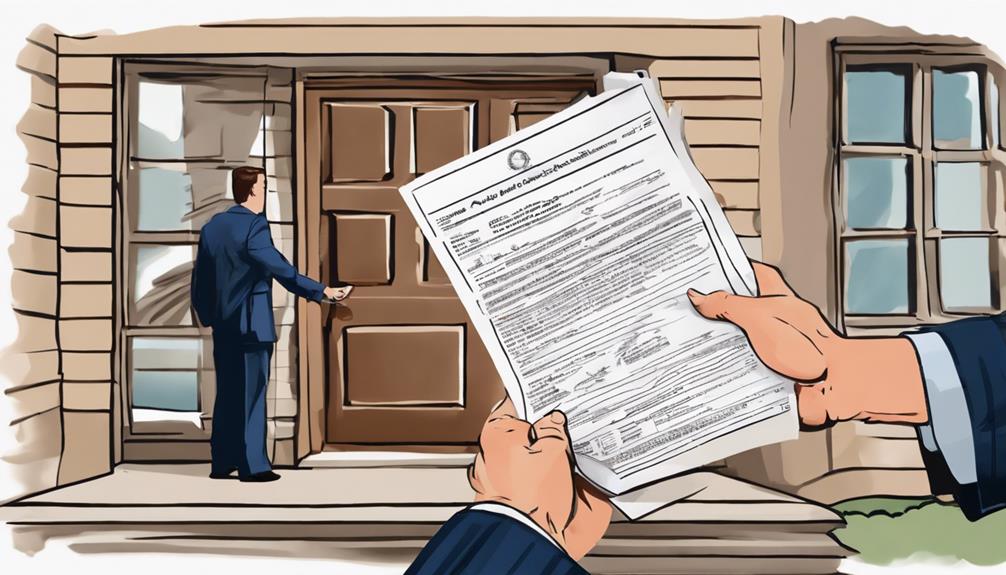In order to successfully navigate the divorce process in Idaho, it is crucial to have a clear understanding of residency requirements, grounds for divorce, the filing process, serving divorce papers, types of divorce, available legal assistance, and key considerations like alimony, child custody, asset division, and name change. Each step is vital to ensuring a smooth transition into the next chapter of life.
However, there's one aspect that often gets overlooked but can significantly impact the outcome of a divorce settlement.
Key Takeaways
- Establish Idaho residency for 6 weeks before filing.
- Understand fault and no-fault grounds for divorce.
- Differentiate between contested and uncontested divorce.
- Finalize the divorce decree after the 20-day waiting period.
Residency Requirements
When starting the divorce process in Idaho, it's essential to first establish residency for at least six weeks before filing. Idaho's residency requirements are less stringent compared to other states, making it a relatively straightforward process to meet the necessary criteria. The plaintiff spouse must ensure they've resided in Idaho for the required six-week period before initiating the divorce proceedings. This step is crucial in meeting the legal requirements for filing for divorce in the state.
Establishing residency involves physically living in Idaho for the specified duration, indicating a genuine connection to the state. This requirement ensures that the court has jurisdiction over the divorce case and can oversee the proceedings effectively. By meeting the residency requirements promptly, the plaintiff spouse can progress smoothly through the divorce process without delays or complications. It's important to pay close attention to this initial step to ensure a seamless transition into the subsequent stages of the divorce proceedings in Idaho.
Grounds for Divorce

Exploring the grounds for divorce in Idaho reveals a range of options, including fault and no-fault reasons to dissolve a marriage. Idaho law allows for both fault and no-fault grounds, giving individuals the flexibility to choose the most appropriate basis for their divorce. No-fault grounds such as irreconcilable differences and living separately for five years offer a less confrontational path to divorce. On the other hand, fault-based grounds like adultery, extreme cruelty, and willful desertion require proving the misconduct of one spouse. Below is a table summarizing the grounds for divorce in Idaho:
| Grounds for Divorce | Description |
|---|---|
| Irreconcilable Differences | No mutual agreement to continue the marriage. |
| Adultery | One spouse's extramarital affair. |
| Separation | Living apart for five years without cohabitation. |
When considering divorce in Idaho, seeking legal advice from a knowledgeable divorce attorney is recommended to navigate the complexities of the different grounds and make informed decisions.
Filing the Initial Paperwork
When starting a divorce process in Idaho, ensuring the completion of the required initial paperwork is crucial. These documents, such as the Petition for Divorce and Summons, set the legal process in motion.
It's essential to accurately fill out these forms and submit them to the court to begin the divorce proceedings smoothly.
Required Forms and Documents
To begin the process of filing for divorce in Idaho, one must gather and complete the required forms and documents. These include the Petition for Divorce, Summons, Certificate of Divorce, and Family Law Case Information Sheet. When dealing with cases involving minor children, additional documentation may be necessary to address custody and support matters.
These forms can conveniently be accessed on the CourtSelfHelpIdaho website, offering guidance and resources for a smoother process. Seeking the advice of an attorney is recommended to ensure the paperwork is correctly filled out and filed. Additionally, be prepared to submit the required filing fee or a Fee Waiver Motion along with the completed forms to initiate the divorce proceedings promptly.
Submitting to Court
Submitting the initial paperwork for your divorce in Idaho is a crucial step in starting the legal process. When filing for divorce, it is essential to ensure that all required documents, such as the Petition for Divorce, Summons, and Certificate of Divorce, are completed accurately. Additionally, specific forms like the Family Law Case Information Sheet may be necessary based on your case circumstances. Addressing filing fees or submitting a Fee Waiver Motion is also crucial when submitting the initial court forms for divorce in Idaho. Properly handling the initial paperwork is vital to initiate the divorce process smoothly. Below is a table outlining key aspects related to submitting the initial paperwork for your divorce in Idaho:
| Aspect | Information |
|---|---|
| Filing Fees | Payment required or Fee Waiver Motion |
| Required Documents | Petition for Divorce, Summons, Certificate of Divorce, Family Law Case Information Sheet |
| Legal Process | Initiating the divorce process in Idaho |
Serving Divorce Documents

When serving divorce documents in Idaho, it's crucial to ensure your spouse is formally notified of the proceedings. Proper service is essential for the legal process to proceed smoothly, whether through an Acknowledgment of Service, a sheriff, or a process server.
Understanding the required serving methods and timing considerations is key to moving forward with the divorce process in Idaho efficiently.
Required Serving Methods
Serving divorce documents in Idaho requires utilizing approved methods like personal service by a process server, sheriff, or third-party individual. Legal notification must be ensured through these methods to move forward in the divorce process and establish court jurisdiction.
Here are some key points to consider:
- Personal Service: Delivering divorce papers in person to the spouse.
- Affidavit of Service: Obtaining this document after serving the papers to prove proper notification.
- Alternative Methods: Mailing divorce papers may be considered in unique situations where personal service isn't feasible.
These steps are crucial to ensure that the divorce process proceeds smoothly and within the legal framework of Idaho.
Proper Timing Considerations
Timely delivery of divorce documents is a critical factor to ensure compliance with legal requirements in Idaho. In Idaho, divorce papers must be served within a specific timeframe after filing to meet legal compliance standards. Failing to serve the divorce documents promptly can result in delays in the legal process, hindering the efficient progression of divorce proceedings. Adhering to the correct timing for serving divorce documents is crucial for a smooth and timely divorce process. Ensuring proper timing not only satisfies legal obligations but also helps move the divorce proceedings forward smoothly. Below is a table summarizing the importance of serving divorce documents on time:
| Importance of Proper Timing for Serving Divorce Documents |
|---|
| Ensures Legal Compliance |
| Prevents Delays in the Legal Process |
| Facilitates Efficient Progression of Divorce Proceedings |
Contested Vs. Uncontested Divorce

In navigating the process of divorce in Idaho, understanding the distinction between contested and uncontested divorce is crucial for informed decision-making and smoother proceedings.
- Contested Divorce: In Idaho, a contested divorce involves disagreements that require court intervention to resolve. This can make the process more time-consuming and costly due to the need for court decisions.
- Uncontested Divorce: Conversely, uncontested divorces in Idaho occur when both spouses agree on all terms without court involvement. These divorces typically proceed faster and with less conflict, leading to potentially smoother outcomes for both parties.
- Impact on Process and Outcomes: The choice between contested and uncontested divorce in Idaho can significantly impact the divorce process and outcomes. Understanding the implications of each type of divorce can help individuals make informed decisions that align with their goals and priorities.
Waiting Period

Upon filing for divorce in Idaho, a mandatory waiting period of 20 days ensues before the finalization of the divorce proceedings. This waiting period allows both parties the opportunity to address any concerns, objections, or contestations. It provides a window for negotiations and agreements to be reached regarding crucial matters such as child custody, alimony, and the division of assets. During this time, it is crucial for both parties to communicate effectively and work towards resolving any outstanding issues amicably.
To further understand the significance of the waiting period in an Idaho divorce, let's delve into a breakdown of what can be achieved during this timeframe:
| Negotiations | Agreements | Finalization |
|---|---|---|
| Child Custody | Alimony | Decree of Divorce |
| Division of Assets | Objections |
It is important to utilize this waiting period wisely, ensuring that all necessary discussions are held, and agreements are reached to facilitate a smoother divorce process.
Finalizing the Divorce Decree

With careful consideration and attention to detail, we finalize the divorce decree, a pivotal document officially terminating the marriage and outlining essential terms. The final divorce decree encompasses crucial aspects that need thorough consideration:
- Child Custody: Determining the custody arrangement for any children involved is a significant component of the divorce decree.
- Division of Property: The decree will outline how assets and debts are divided between the parties, ensuring a fair distribution.
- Spousal Support and Visitation Rights: Details regarding spousal support payments and visitation schedules, if applicable, are included to provide clarity on post-divorce arrangements.
It's imperative to note that the divorce decree is a legally binding document that both parties must adhere to. Failure to comply with the terms outlined in the decree can lead to legal consequences.
While modifications to the decree are possible under certain circumstances, they necessitate court approval to ensure fairness and adherence to the law, ultimately concluding the divorce process effectively.
Frequently Asked Questions
What Is the Fastest Way to Get a Divorce in Idaho?
The fastest way to get a divorce in Idaho is through an uncontested agreement where both parties are in accord. This approach reduces conflicts, accelerates the process, and empowers couples to swiftly finalize their divorce with minimal court involvement.
What Is the Timeline for Divorce in Idaho?
We know divorce timelines in Idaho vary. Final decrees usually come after 21 days. Contested cases could take 6 months. Uncontested divorces move faster if agreements are reached. Factors like cooperation and court schedules affect resolution speed.
Does It Matter Who Files for Divorce First in Idaho?
It doesn't typically matter who files first for divorce in Idaho due to no-fault laws. The petitioner, who files first, may gain some strategic advantages in preparation and timeline control but does not guarantee settlement outcomes.
Do You Need a Lawyer to Get Divorced in Idaho?
Yes, you can get divorced in Idaho without a lawyer. However, having one can safeguard your interests, especially in complex matters like child custody and property division. Consultation with a lawyer clarifies your rights and options.
Conclusion
In conclusion, getting a divorce in Idaho may seem like a daunting task, but with our comprehensive guide, it can be a smooth and manageable process. By following the 7 steps outlined, you'll be on your way to a fresh start in no time.
Remember, while divorce can be overwhelming, with the right preparation and support, you'll navigate through it with ease. Trust the process, stay strong, and embrace the new chapter ahead.










